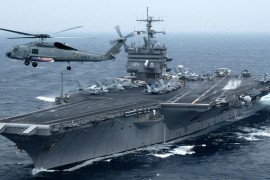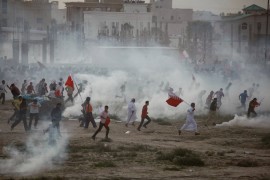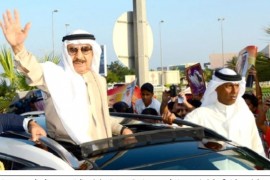The Supreme Court of the United Kingdom has eradicated Prince Nasser bin Hamad Al-Khalifa’s hopes for attaining a seniorpost in the ruling establishment in Bahrain. The trial on October 7th ruled that thefourth son of the King of Bahrain is no longer diplomatically immune due to cases of alleged torture. The case was filed by someone with the initials (F.F.) during theOlympics hosted by London in summer 2012.
Despite all the support the spoiled childwas receiving from his father, it may seem difficult for Nasser to attain the position ofthe Crown Prince, Prime Minister, or even Defense Minister after such an incident. King Hamad and his aides from Al-Khawalid’s branch of the royal family were preparing Prince Nasser for more than a decade to acquire one of these posts especially under public, Al-Khalifa, Sunni, and pro-Westernsuspicions, in the ability of the Crown Prince Salman bin Hamad Al-Khalifa to safely rule the country. That is also why we can say that the Crown Prince seems the happiest among all the prominent Al-Khalifa figures after this judgment against his half-brother, who is his main rivalamong six male brothers, from the King’s three wives. (See: The hidden struggle: the future of the Crown Prince post in Bahrain: http://www.bcsl.org.uk/ar/studies/royal-confilct/1531-royal-confilct?start=6)
Without exaggeration, the British judicial decision can be described as historic being the first of its kind extracted by opposition parties against a Gulf country closely related to the British Crown keeping in mind that the British authorities have been able to delay Nasser’s trial oncharges of torture for nearly three years. These authorities claimed during this past period that the son of Bahrain’s King enjoys immunity which prevents his appearance before the court, being a member of the ruling Al-Khalifa family, which was recently refuted by theBritish court.
The judicial ruling, which has spread in the international media like wildfire, opens the way for procedural trials of the King’s spoiled son not only in the courts of the United Kingdom, but also in European courts, especially that the judgment of the Supreme Court in London, could be the base on which courts of the old continent consider to accept torture accusations filedagainst Nasser. This also possibly opens a hypothesis worthy of study of the British judicial decision that Nasser could be handed in to the London police by other countries.
It must be said that there is a long way until Nasser ends up in jail and receives the retribution he deserves for the accusations made against him regarding torture because there are a lot of legal loopholes that can be used by the British persecutors. Meanwhile, the Gulf-British relations will be at stake to prevent the closure of the case because it would mean maintaining justice for the victims.
But what has happened so far is causing clear distress to Prince Nasser, his father, and his father in law Shaikh Mohammed bin Rashid Al Maktoum, the Vice President of the United Arab Emirates and constitutional monarch of Dubai who is one of the pillars whom Nasserrelies upon in attaining a leading role in Bahrain.
However, the main supporter of Prince Nasser is his father, who had worked for years to push his fourth son to become a well-known figure both locally and globally, through a diversified combination of PR functions and prominent honorary positions. The controversial media propaganda have tried to present the Prince as promising youth leader, but an error in judgment in the light of the security frenzy and a manic reaction against those demanding democracy have banished the dreams of the young Prince and his father.
The mistake that entangled Nasser is with regards to frequent allegations of torture againstpolitical detainees opposed to his father’s authoritarian rule, specifically to opposition members Mohammad Habib Al-Miqdad, and Abdullah Al-Mahroos. They have been detained since March 2011 following the Saudi intervention in Bahrain, the use of force to break up a sit-in at the Pearl roundabout (February 14 – March 16, 2011), and the outrageous conduct of torture on a large scale during the state of emergency (March 15 -May 30, 2011).
One may argue that the allegations put forward by Al-Miqdad’s and Al-Mahroos’ are not based on suspicions of an opposition group, but here comes the biggest mistake done byNasser. When he spoke publicly on Bahrain TV, on his own initiative, he threatened to retaliate from those calling to topple the regime, (http://www.youtube.com/watch?v=ioEkV_XWfNc ). This video is regarded as evidence that encouraged the eminent British lawyers to accept pleading in the case and have found a solid foundation.
Nasser’s fanatical stance against democracy calls has reinforced the Bahraini youth alliancewith the military forces, the Al-Khawalid’s branch of the royal family, high-ranking figures in the regime, loyalists, fundamental Islamic groups, and most importantly with Saudi, the leader in counter revolutions. However, this presented Nasser on the international level as an impulsive personality, unable to control his emotions, a person who can kill in daylight and cause bloodshed in front of television cameras. As a result, Western consultants have advised their friends from Al-Khalifa to practice repression in a less obvious and visible manner.
Perhaps it is now time for King Hamad to accept his defeat and abandon his hopes that his spoiled son will have a distinctive role in the double-headed Kingdom he planned for: the head of the Crown Prince Salman and the head of Prince Nasser. However, that does not at all mean the path is now smoothly paved for the Crown Prince, who does not enjoy the confidence of Sunni loyalists nor finds support in the military institution




